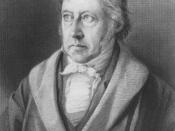Introduction
The objective of this paper is to write a response to the Eurocentrism of G. W. Hegel. Eurocentrism is, "the practice of consciously or unconsciously privileging the culture of the West over other cultures."�To achieve this, this paper will expose the Eurocentrism of Hegel and its response simultaneously before making a conclusion. Hegel was born in Stuttgart, Germany in 1770 and died in 1831 and is buried in Berlin. He was a German idealists and some of his works include; The Philosophy of History and Lectures on the History of philosophy.
Eurocentrism of Hegel and its response
In order to suit his malicious intentions and have a firm foundation to lay down his own ideologies, Hegel started by dividing Africa into three parts,
one is that which lies south of the desert of Sahara-Africa proper-the upland almost unknown to us, with narrow coast tracts along the sea; the second is that to the north of the desert-European Africa (if we may so call it)-a coastland; the third is the region of the Nile, the only valley-land of Africa, and which is in connection with Asia and which is in connection with Asia.�
He was aware that by connecting Egypt to Asia, the role which Ancient Egypt played in Western civilization will not be of African origin. Furthermore, by connecting northern Africa which lies in the Mediterranean to Europe great figures like St. Augustine born in Tagaste which is current Tunisia, is origin will not be African but European. This is a malicious intention and Hegel only did this not for any other reason but to distort history so as to show how primitive Africa was. Despite Hegel dividing Africa into three in order to suit his ideologies, history has shown that, "ancient Egypt tradition had its foundation in...


